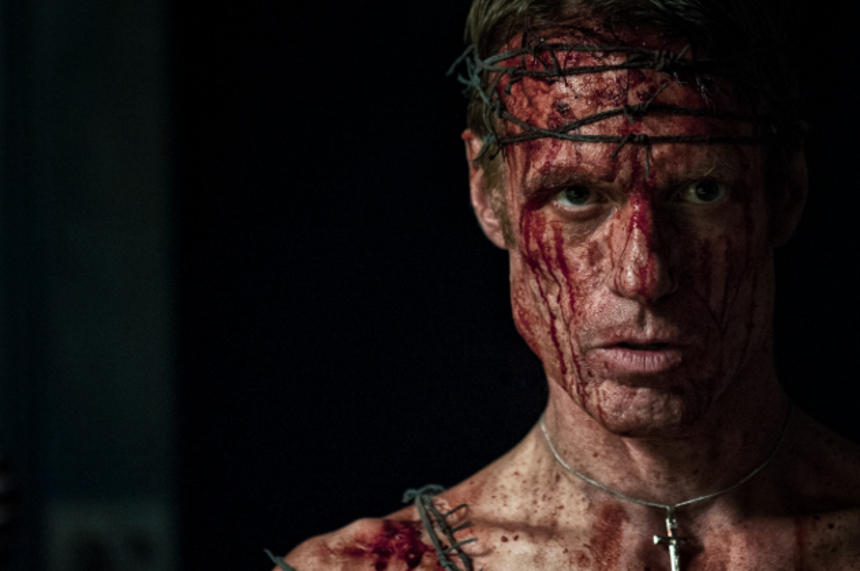Fantastic Fest 2014 Review: Strong Visuals Not Enough to Save LET US PREY

Known primarily for stuffy literary films and the odd historical potboiler, or losing its talent to more attractive industries in the English diaspora, Ireland has, in recent years, become an unlikely purveyor of impressive genre fare.
Though horror films are not a new phenomenon on the Irish filmmaking scene, never have there been so many, and unlike earlier efforts, the liberalisation afforded by cheaper digital filmmaking has brought about an aesthetic transformation to an industry formally unknown for its visual panache. One of the latest Irish horrors film to hit the scene is the paranoia-inducing chamber piece Let Us Prey, a co-production with Scotland.
A police officer is transferred to a remote town and just as she gets to work before the sun rises, another visitor arrives to town. He is hit by a car but vanishes from the crime scene, leaving the transferred officer empty-handed in front of her new colleagues, who have little patience for her by-the-book policing style. Yet the man appears at the police station shortly thereafter, and brings a strange aura of paranoia with him. The local doctor visits to tend to his wounds but soon tries to kill him, which sends both of them to the underground cells. It isn't long before dark secrets in this dormant rural community come pouring out.
Opening on austere vistas of the countryside, adorned with the ominous presence of a crow, Let Us Prey quickly gets under your skin with its sharp photography and editing. It sets an intriguing mystery into motion by introducing the terse, bearded stranger, and no sooner has it introduced us to all its main protagonists then their true characters are cast into doubt.
Following a familiar but engaging set up, Let Us Prey wastes no time in demonstrating that there is a reason the local police force is so defensive about the presence of the new transferee. Everyone is harboring a secret and the reason behind the stranger's presence, clearly supernatural in nature, becomes clear before long. Scriptwriters David Cairns and Fiona Watson go the extra mile to show us how far off the path this community has gotten, but the ridiculously high concentration of sociopathy in what appears to be little more than a village makes the plot one that is difficult to take seriously (as these things go), particularly by being revealed so early on.
Known to many for his role on the popular HBO show Game of Thrones, Liam Cunningham carries the show here with a stolid performance as the quiet but threatening outsider. Through the rolling cadence of his voice and the steely calmness of his piercing gaze, the anxiety he spreads to his surroundings is palpable. The role brings to mind such iconic turns as Rutger Hauer in The Hitcher (1986), and though ultimately the script is unable to capitalize on the stranger's menacing air, Cunningham does his best with what he is given.
The rest of the cast fares well, but beside Cunningham, whose presence lingers even when he isn't on screen, their characters are quickly forgotten about. As the transferred police officer, Pollyanna McIntosh shows us a tough exterior that can handle just about anything while also being far more empathetic than any of new colleagues. Getting to show off his crazy chops is Douglas Russell as the precinct lieutenant, stern and bitter and harbouring a particularly nasty, if somewhat preposterous, secret.
Building to a bloody, frenzied climax, which sees characters pushed to the brink and capable of anything to save their own skin, Let Us Prey remains visually interesting, but by the final reel it has long since lost the sense of mystery it introduced early on, failing to harness it by introducing a humdrum backstory and uninspired motive behind the visitor's presence. Still, director Brian O'Malley gets things off to a good start with a taut narrative and particularly a moody and precise mise-en-scene that remains effective until the very end. Alas, the film is let down by a concept that feels underdeveloped and motivations that seem little more than convenient machinations to set standard shocks and thrills into motion.







